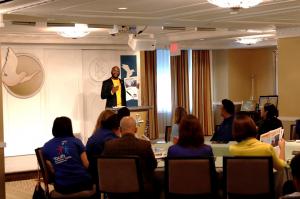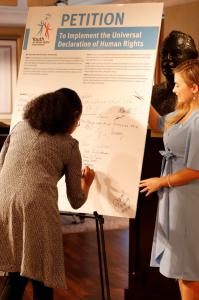Recent shootings in DC lead the community to come together to find solutions to gun violence
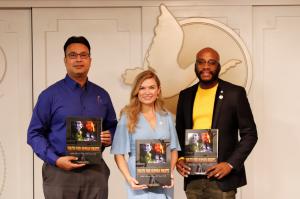
Azhar Hag, President of Youth for Human Rights DC; Erica Rodgers, Director of the National Office of Youth for Human Rights; and Rev. Travis Ellis, Youth for Human Rights supporter
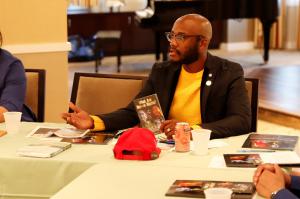
Rev. Travis Ellis talks about the need for broad human rights education as he tell the story of a youth trying to legally sell water on a corner that inadvertently caused a turf dispute between youth, escalated to involving adults and guns and deadly forc
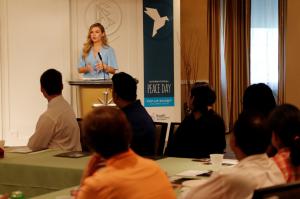
Erica Rodgers, Director of the National Office of Youth for Human Rights speaks about the 30 human rights in the Universal Declaration of Human Rights – including Human Right #3, The Right to Life.
Youth for Human Rights hosts roundtable discussion to get the community involved in building peace in our Nation’s Capital.
Erica Rodgers, Director of the National Office of Youth for Human Rights International and organizer of the roundtable, opened the discussion by saying, “We are here to create solutions together that can contribute to building a more peaceful community.”
Speaking about his experience combating violence in the DC community, Reverend Travis Ellis was both a featured speaker and participant in this roundtable discussion. As the founder of the organization Yaay Me!, a mentoring, workforce development, program design, and non-profit consulting group located in the DC Metropolitan area, Reverend Ellis works to empower inner city youth with tools to lead them to success. Reverend Ellis talked about his use of the Youth for Human Rights education curriculum with at-risk youth to give them an understanding of their fundamental human rights. He is educating youth on human rights and then taking them to talk with local police officers to “flip the script” and read the officers their human rights which contrasts with the more expected scenario of these inner city youth being read their Miranda rights. “Flipping this script produces constructive conversation between these youth and police,” declared Reverend Ellis. He feels strongly that lack of communication skills can cause violence to escalate very quickly which underscores the necessity of developing respect for one another to avoid violent crimes. The Youth for Human Rights educational materials are the main tools Reverend Ellis has used to teach youth to respect one another's human rights and use dialogue rather than turning to violence. “We need to teach our young people that the best way to resolve arguments is through good communication skills and respect for one another’s rights,” stated Reverend Ellis.
Another issue brought up by participants of the round table was the shortage of parks and recreational facilities for use by youth. “Places like parks and basketball courts that provide safe spaces are being turned into dog parks rather than a place for our young people to constructively get out their energy and play! This is a violation of children's right to play!” said a concerned mother attending the roundtable. In the 1980s, then-DC Mayor Marion Barry created a program that kept the lights on at basketball courts late into the evening with police on duty to play basketball with local youth. This program helped develop trust between inner city youth and the police. Creating a similar program today was presented as a solution by the roundtable, along with establishing more community sporting events and activities to engage youth and keep them busy with constructive activities.
Concluding the roundtable, Ms. Rodgers highlighted the following quote from United Nations Secretary-General António Guterres: “Discrimination diminishes us all. It prevents people — and societies — from achieving their full potential.”
Ms. Rodgers said, “One of the best ways to end violence and promote peace is though creating respect for human rights. This is done through promotion and education about basic rights.” To celebrate their commitment to promoting peace and tolerance through human rights education, attendees of the roundtable signed a petition to incorporate human rights education into local schools.
The Founding Church of Scientology of Washington, DC, hosted the community roundtable. The Church supports Youth for Human Rights International’s initiative of broad human rights education in the community. Humanitarian and Founder of Scientology, L. Ron Hubbard, firmly supported the United Nations Universal Declaration of Human Rights. In 1969 he issued a directive to all of the staff of Churches of Scientology around the world that “Human Rights must be made a fact, not an idealistic dream.” The Church of Scientology therefore sponsors Youth for Human Rights International to help fulfill Mr. Hubbard's vision of a better world where human rights are a living reality.
About Youth for Human Rights:
Youth for Human Rights International (YHRI) is a nonprofit organization whose mission is to teach youth about the United Nations Universal Declaration of Human Rights and inspire them to become valuable advocates for tolerance and peace. YHRI teaches human rights education both in the classroom and in nontraditional educational settings such as art exhibits, concerts and other interactive community events. Their most recent campaign has included #KnowYour30 with the deliberate purpose of increasing awareness of the 30 human rights every person has and how they are a part of everyday life. To learn more go to https://www.youthforhumanrights.org or watch a documentary on how Youth for Human Rights began by going to www.scientology.tv
Press Office
Youth for Human Rights International - National Office
+1 202-667-6404
email us here
Legal Disclaimer:
EIN Presswire provides this news content "as is" without warranty of any kind. We do not accept any responsibility or liability for the accuracy, content, images, videos, licenses, completeness, legality, or reliability of the information contained in this article. If you have any complaints or copyright issues related to this article, kindly contact the author above.

